Algebraic Thinking: Conceptions of Elementary School Teachers
DOI:
https://doi.org/10.15359/rep.9-1.6Keywords:
elementary school, algebraic reasoning, algebrization of arithmetics, functional thinking, generalizationAbstract
Students’ algebraic reasoning, at the beginning of their schooling years, includes the development and promotion of functional thinking and the understanding of mathematical properties, which can be stimulated by solving problems. In the latest Portuguese Program for Mathematics Elementary Education, we do not see the topic Algebra in the first year of school although some other topics include objectives of algebraic nature. This fact showed the importance of research about the introduction of concepts and development of algebraic skills by elementary school teachers. We investigated the concept of algebraic thinking and how it has been addressed, by interviewing 50 teachers from Portugal. The results showed that the respondents agree with algebraic experiences in the early years of school; however, the data showed a considerable distance when compared to the concept of “algebraic reasoning” adopted by the current scientific community have of algebraic reasoning. With regard to activities that contribute to its promotion, problem solving was considered to play an important role in the development of algebraic skills as well as its representation and generalization.
References
Ameron, A. (2003). Focusing on Informal Strategies When Linking Arithmetic To Early Algebra. Educational Studies in Mathematics, 54, 63-75.
Baroody, A. (2002). Incentivar a Aprendizagem Matemática das Crianças. In B. Spodek, Manual de Investigação em Educação de Infância (pp. 333-390). Lisboa: Fundação Calouste Gulbenkian.
Blanton, M., & Kaput, J. (2003, Outubro). Developing Elementary Teachers - Algebra Eyes and Ears. Teaching Chlidren Mathematics, pp. 70-77.
Cai, J. & Moyer, J. (2008). Developing Algebraic Thinking in Earlier Grades:Some Insights from International Comparative Studies. Reston: NCTM.
Carraher, D., & Schliemann, A. (2007). Early Algebra and Algebraic Reasoning. In F. Lester, Second Hanbook of Research on Mathematics Teaching and Learning: A project of the National Council of Teachers of Mathematics (pp. 669-705). N.C: Information Age Publishing.
Carraher, D., Earnest, D., Schliemann, A., & Brizuela, B. (2006). Arithmetic and Algebra. In Early Mathematics Education. Journal for Research in Mathematics Education, 37(2) 87-115.
Curcio, F. (1997). What does Algebric Thinking look like and sound like with Preprimary Children? Teaching Children Mathematics, pp. 296-300.
Kieran, C. (2004). Algebraic Thinking in the Early Grades: What Is It? The Mathematics Educator, 8(1), 139 - 151.
Kieran, C. (2006). Research on the Learning and Teaching of Algebra. A Broadening of Sources of Meaning. In A. Gutièrrez, & P. Boero (Eds.), Handbook of Research on the Psyschology of Mathematic Education. Past, Present and Future. (pp. 11-49). Rotterdam: Sense Publishers.
Kieran, C. (2007). What do we know about the Teaching end Learning of Algebra in the Elementary Grades? Reston: NCTM.
National Center for Improving Student Learning and Achievement in Mathematics and Science [NCISLA] (2000). Building a Foudantion for Learning Algebra in the Elementary Grades, 1(2). Available In http://www.wcer.wisc.edu/ncisla
National Council of Teachers of Mathematics [NCTM] (2008). Algebra: What, When, and for Whom. Available In http://www.nctm.org/uploadedFiles/About_NCTM/Position_Statements/Algebra%20final%2092908.pdf
Mestre, C. & Oliveira, H. (2011). Generalizar Estratégias de Cálculo: Um Estudo sobre o Pensamento Relacional de Alunos do 4ºAno de Escolaridade. XXII SIEM. Lisboa.
National Center for Improving Student Learning and Achievement in Mathematics and Science [NCISLA] (2000). Building a Foudantion for Learning Algebra in the Elementary Grades, 1(2). Available In http://www.wcer.wisc.edu/ncisla
Schliemann, A., Carraher, D., & Brizuela, B. (2012). When Tables Become Function Tabels. Available In http://ase.tufts.edu/education/faculty/docs/schliemanntables.pdf
Steen, L. (1998). Available In http://www.stolaf.edu/people/steen/Papers/algebra_mn.pdf
Thomson, P., & Smith III, J. (n.d.) Quantitative Reasoning and the Development of Algebraic Reasoning. In J. C. Kaput, Employing Children' s Natural Powers to Build Algebraic Reasoning in the Context of Elementary Mathematics. (in press).
Vlassis, J. & Demonty, I. (2008). A Álgebra Ensinada por Situações Problemas. Lisboa: Instituto Piaget.
Downloads
Published
How to Cite
Issue
Section
License
Ensayos Pedagógicos is subscribed to the Attribution-NonCommertial-NoDerivatives 4.0 International Creative Commons Licence, which allows both authors and readers to freely download, store, copy, and distribute the final approved publisehd version of the manuscript (post-print) as long as this is done without commercial purposes, no derivative works are generated, and the source and author are mentioned. As well, Ensayos Pedagógicos declares that authors will remain the rightful owners of the copyrights of their work in perpetuity.







